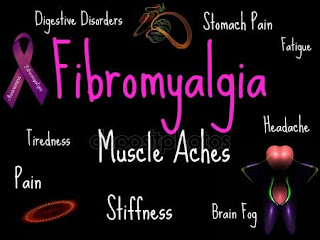Fibromyalgia is a chronic condition that causes widespread pain, tenderness and a whole host of other symptoms.The pain and fatigue that are associated with Fibromyalgia are debilitating and relentless, but this chronic invisible illness involves so much more than that. So many are unaware of the multitude of Fibromyalgia symptoms and the effects they have on day-to-day living.
PAIN SYMPTOMS
The most prominent symptoms of Fibromyalgia include pain. The pain can manifest in many ways such as burning, stabbing, aching, numbness and tingling. Pain symptoms include headaches, tender points or trigger points, muscle pain, muscle twitching, muscle weakness, paralysis or severe weakness of an arm or leg, joint pain, TMJ syndrome and chest pain. The chest pain can be so severe that it feels like a heart attack.
NEUROLOGICAL SYMPTOMS
It was recently in the news that researchers have found a neurological connection to fibromyalgia. Neurological symptoms include lightheadedness, inability to think clearly (also known as brain fog or Fibro fog), seizures, seizure-like episodes, fainting, dizziness, numbness or tingling sensations, ringing in one or both ears, sensitivity to light and noise intolerance. Other symptoms are feeling spatially disoriented, balance difficulty, clumsy walking, dropping things frequently, difficulty judging distances and difficulty seeing what you are looking at.
GASTROINTESTINAL SYMPTOMS
Gastrointestinal symptoms are stomachache and cramps, nausea, vomiting, heartburn, frequent diarrhea, and constipation, bloating, decreased or increased appetite, food cravings, and weight gain or weight loss.
EMOTIONAL SYMPTOMS
Fibromyalgia greatly affects a person’s mood. Emotional symptoms are depression, suicidal thoughts, suicide attempts, frequent crying, feeling helpless and hopeless, inability to enjoy previously enjoyed activities, anxiety, irritability and overreaction, anger outbursts, unpredictable mood swings, phobias and personality changes. It’s important to note that Fibromyalgia causes depression. Depression does not cause Fibromyalgia.
SLEEP SYMPTOMS
Sleep symptoms include excessive sleeping, unrefreshing or non-restorative sleep, difficulty falling asleep, difficulty staying asleep and vivid or disturbing dreams or nightmares. The sleep symptoms of Fibromyalgia can be some of the most frustrating because without a good night’s sleep, the body can’t rest and this causes the pain to become even more unbearable.
SENSITIVITIES
Fibromyalgia causes you to be more sensitive to just about everything. You become more sensitive to medications, odors from cleaning products, exhaust fumes, colognes, hairsprays, etc., and foods. Those with Fibromyalgia may also experience Alcohol intolerance and an alteration of taste, smell, and hearing.
OTHER
Other symptoms of Fibromyalgia include rashes or sores, eczema or psoriasis, hair loss, mitral valve prolapse, cancer, dental problems, gum disease, canker sores, eye pain, changes in visual acuity, difficulty switching focus from one thing to another, blind spots in vision, hemorrhoids, nosebleeds, frequent urination, painful urination or bladder pain, prostate pain, impotence, Endometriosis, worsening of PMS and decreased sex drive.
Fibromyalgia is difficult to treat and even harder to understand. All of the symptoms of Fibromyalgia make it extremely difficult for people to believe you and this makes coping with this invisible illness all the harder.







